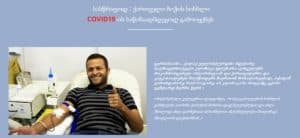Fact-checking expert Sopho Gelava describes how hoaxes and conspiracy theories have mushroomed in Georgia as a result of the coronavirus crisis, and analyses what lies behind this phenomenon.
The coronavirus pandemic triggered an explosion of fake news stories and conspiracies in Georgia. These fall into two main categories: those that function as clickbait and are designed to make money for their creators, and those whose perpetrators have a political agenda and whose aim is to undermine public trust in the authorities’ ability to deal with the outbreak.
Clickbait stories: miracle cures and microchips
A number of Covid-19-related stories have appeared in both traditional and online media whose main aim is to boost traffic to their sites and so generate extra income. Many of these describe miracle cures for the disease, while others adopt a populist stance and play to a sense of Georgian superiority. Still others recycle familiar conspiracy theories relating to coronavirus such as the 5G myth.
Among the clickbait stories on miracle cures is one about a Georgian homeopath who claims to be able to treat Covid-19 with crocodile blood. According to the fact-checking platform Myth Detector set up by the Media Development Foundation (MDF), the website Progressnews carried a piece about the homeopath, Kakha Sabakhtarashvili, who said he had created a remedy based on crocodile blood which he claimed was effective against the coronavirus.
Another newspaper, the tabloid Alia, carried an interview with a man who said he was a specialist in photomedicine and claimed to have a drug, Corvirant, which he said had proved to be successful in the treatment of respiratory infections including Covid-19. There is no evidence that such a drug actually exists.

One clickbait site used an old photo from a blood donation campaign to support a fraudulent claim about the properties of Georgian blood. Source: Myth Detector
In addition to these self-styled specialists who claim to have invented remedies for Covid-19, some websites have sprung up with aim of capitalising on intense public interest in the subject. Their purpose is also to make a profit: by inventing fake news stories about the coronavirus and using sensationalist headlines and colourful visualisation to make them as attention-grabbing as possible, they drive up traffic to the site and hereby increase income.
Some of these clickbait websites have found a way to make their invented stories appeal to Georgians’ patriotic instincts and sense of uniqueness. For example, the site Alternews carried a story claiming that Georgian blood had special properties that meant it could be used to treat Covid-19. This story quickly went viral. Another clickbait website claimed that a Georgian man’s blood had been used to treat a Covid-19 patient in Germany. The story was accompanied by a two-year-old photo that was first used by the Pan-American Health Organization as part of its campaign to encourage more people to donate blood.
Clickbait stories have also been used to cash in on persistent myths such as the conspiracy theory linking 5G technology to the coronavirus. An old conspiracy theory that has been extensively shared by Georgian websites and Facebook pages and given a new spin is the one according to which Pope Francis approved of the idea of people being microchipped. An investigation by Myth Detector revealed that the clickbait sites pushing this conspiracy theory operate a network of channels, several of them linked to the campaign against 5G and other Covid-19 conspiracy theories. The nature of the advertisements posted on the sites that have shared the Pope Francis clickbait suggests that the main aim is to generate revenue from the story.
Pro-Kremlin disinformation narratives
In addition to the clickbait stories published mainly to boost profits, political forces have also sought to capitalise on the coronavirus crisis, using it to promote and amplify pro-Kremlin disinformation narratives.
The principal strategy of these political actors has been to demonise the US and a US-funded research laboratory in Tbilisi, the Richard Lugar Center for Public Health Research, popularly known as the Lugar Lab. This medical research facility has been the target of Kremlin propaganda for a number of years. Since the appearance of the novel coronavirus, pro-Kremlin have been pushing various false narratives and conspiracies, such as:
- The US and the Lugar Lab have been involved in developing viruses from bats as a biological weapon;
- The Lugar Lab, aided by the EU Monitoring Mission in Georgia (EUMM), has been collecting biological samples along the dividing line between the breakaway region of South Ossetia (recognised by Russia as an independent state) and Tbilisi-controlled territory;
- The Lugar Lab’s key role in combating the Covid-19 pandemic has been exaggerated.
The Kremlin’s disinformation campaign against the Lugar Lab is not new; before the novel coronavirus arrived on the scene, pro-Kremlin sources accused the Lab of spreading swine flu, the zika virus, brown marmorated stinkbug and African swine fever, among others. The EUvsDisinfo database compiled by the European External Action Service’s East Stratcom team currently lists 57 cases of disinformation related to the Lugar Lab.
In summary, two main types of sources have been observed to spread fake news and conspiracies linked to the coronavirus. On the one hand, we have seen newly emerging clickbait websites seizing the opportunity to make a profit out of the Covid-19 pandemic by encouraging the dissemination of hoaxes about miracle cures and in the process sowing confusion and mistrust. On the other hand, those pro-Kremlin and anti-Western sources whose aim has long been to discredit the Georgian government’s pro-Western foreign policy have taken advantage of the crisis to sow doubts in the public mind about the country’s alignment with the Western Europe and the United States.
Opinions expressed on this website are those of the authors alone and do not necessarily reflect or represent the views, policies or positions of the EJO.
If you liked this story, you may also be interested in Fact-checkers go into battle against coronavirus misinformation.
Sign up for the EJO’s regular monthly newsletter or follow us on Facebook and Twitter.
Tags: clickbait, conspiracy theories, coronavirus, Covid-19, dis/misinformation, fact-checking













































